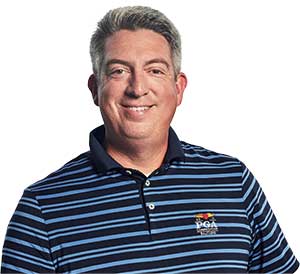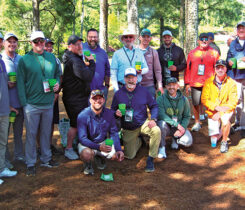Keeping up with the Jones: Talking mental health at home plate

Seth Jones
I was on my way to New Hampshire to play in the NHGCSA Gold Ball Tournament. I was happy to be paying off a contest won almost a year ago by the New Hampshire chapter. All I had to do was show up, play golf in the New Hampshire mountains and buy the guys a round of drinks. How’s that for a day’s work?
I checked Twitter as I waited for the rest of the passengers to board the flight. That’s when I saw the Golf Digest tweet that was blowing up turf Twitter. It was a feature story from Golf Digest’s Ron Whitten on superintendents and their battles with depression and suicidal thoughts. Gulp.
Mental health challenges among golf course superintendents is a growing trend.@RonWhittenGD shares some of their stories, including how they are attempting to help their colleagues who may be contemplating suicide.https://t.co/Dzx4IHeTzC
— Golf Digest (@GolfDigest) September 26, 2019
I know most of the players involved in the story, both dead and alive. I even consider one a friend. Thoughts of suicide? My job is to ask questions and then quietly listen and observe … but in my 20 years in the industry, I wasn’t observant enough to think suicide was an issue I should be covering in the magazine.
My trip to New Hampshire was a breath of fresh air. I golfed with great supers (see the photos here) and was able to decompress for a couple days. I also got to cross two states off my list (New Hampshire and Maine.)
After golf finished, I headed to Boston. I connected with Fenway Park Groundskeeper David Mellor earlier this year at the Sports Turf Managers show, and he invited me to visit the home of the Boston Red Sox. I took him up on his offer.
I also report on the sports turf world — we have a website, AthleticTurf.net, that covers that industry. So, I have a valid excuse to visit these ballparks between traveling to amazing golf courses. I really do have the best job … I get to enjoy all these great venues, while at the same time not having to worry about the conditions at any of these great venues.
Mellor gave me the VIP tour while he shot photos of me with my phone in the dugout and at home plate. Then he asked, “What questions can I answer about Fenway Park?” I told him I didn’t want to talk about Fenway … I wanted to talk about his new book.
Mellor has been hit by a car three different times, and as a result has had to endure 45 surgeries. His story was told on ESPN’s E60 series (“Fenway’s Keeper”) as well as in the SportsCenter story “Dave + Drago.” In June, he published his book “One Base at a Time: How I Survived PTSD and Found My Field of Dreams.”
I found myself discussing mental health with another person, face-to-face, at home plate of Fenway Park of all places.
Mellor told me he’s proud to say he has gone to see a psychologist. He says counseling has made him a better father and a better husband. Despite being hit by a car three times, he calls himself one of the luckiest people in the world. “I’ve been hit by a car three times — I figure that’s better than four,” he says. “I’ve had 45 surgeries. I figure that’s better than 46.”
Mellor says he hopes people will learn from his book and be encouraged to celebrate life every day. He also hopes it will encourage people to not be afraid.
“Tonight, there will be 37,000 people here at the ballpark,” Mellor told me. “Every one of those people, either themselves or a loved one, is dealing with something. We want people to not be afraid to ask for help.”
I’m currently reading Mellor’s book. It’s well timed for October, because it reads like a horror story so far. If you are going through your own personal horror story, please take Dave’s advice — ask for help.











